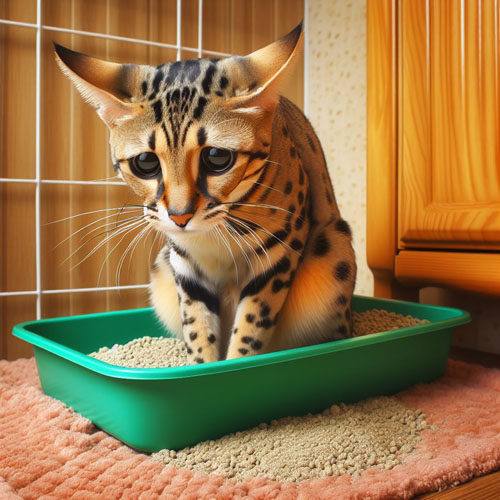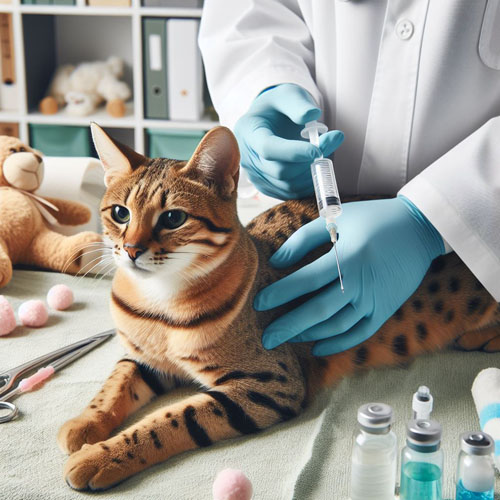Feline Immunodeficiency Virus in Savannah Cats
Feline Immunodeficiency Virus (FIV) in Savannah Cats: Understanding its Rarity, Lifespan, Treatment, and Managing Exposure to Other Cats
Feline Immunodeficiency Virus (FIV) is a relatively uncommon but serious health concern among domestic cats. In this article, we’ll explore the specific aspects of FIV as it pertains to Savannah cats. From its rarity in this unique feline breed to understanding the potential lifespan of an FIV-positive cat, and strategies for treatment and managing exposure to other cats, we aim to provide comprehensive insights into this important topic.
Understanding FIV in Savannah Cats: Savannah cats, known for their striking appearance and hybrid lineage, can also be susceptible to Feline Immunodeficiency Virus. FIV is a slow-acting virus that weakens a cat’s immune system over time, making them more vulnerable to various infections and illnesses. Unlike the more well-known Feline Leukemia Virus (FeLV), FIV primarily spreads through bite wounds during aggressive fights, making it less common.
The Rarity of FIV in Savannah Cats: FIV is generally considered rare in the general cat population, and the same holds true for Savannah cats. The hybrid nature of Savannah cats, resulting from the crossbreeding of a domestic cat with a serval, doesn’t inherently increase the likelihood of FIV transmission. However, like any other cat breed, Savannah cats can be at risk if they engage in aggressive behaviors that involve biting, such as territorial disputes or mating encounters.
Lifespan of FIV-Positive Savannah Cats: The lifespan of an FIV-positive Savannah cat can vary based on several factors, including the overall health of the cat, the presence of concurrent diseases, and the quality of veterinary care provided. While FIV itself doesn’t have a specific cure, with proper management and early intervention, FIV-positive cats can lead relatively normal lives.
It’s important to note that FIV doesn’t guarantee a shortened lifespan. Many FIV-positive cats live for many years without significant health issues. Regular veterinary check-ups, a balanced diet, and a stress-free environment contribute to enhancing the overall well-being of FIV-positive Savannah cats.
Treatment Options for FIV in Savannah Cats: .As of now, there is no cure for FIV, but there are various treatment options and supportive measures to manage the condition and improve the quality of life for affected cats:
- Antiretroviral Medications: Antiretroviral drugs, such as reverse transcriptase inhibitors, may be prescribed to slow the progression of the virus. These medications aim to inhibit the replication of the virus within the cat’s body.
- Antibiotics: FIV-positive cats are more susceptible to bacterial infections due to their weakened immune system. Antibiotics may be prescribed to treat and prevent bacterial infections.
- Immunomodulators: Certain immunomodulating drugs may be recommended to support and boost the cat’s immune response. This can help the cat’s body better cope with infections and maintain overall health.
- Regular Veterinary Monitoring: Routine veterinary check-ups are crucial for FIV-positive cats. Regular monitoring allows veterinarians to detect and address any potential health issues promptly.
Managing Exposure to Other Cats: Preventing the spread of FIV among cats involves managing their interactions and minimizing opportunities for aggressive behaviors. Here are key considerations for managing exposure to other cats, both for FIV-positive and FIV-negative cats:
- Isolation: If a cat tests positive for FIV, it’s advisable to keep them separated from non-infected cats to prevent potential transmission through bites or scratches.
- Spaying and Neutering: FIV is more commonly transmitted through bites that occur during aggressive behaviors, often related to mating activities. Spaying and neutering can help reduce aggressive tendencies, minimizing the risk of FIV transmission.
- Supervised Outdoor Time: If a cat is allowed outdoor access, it should be supervised to prevent fights with other cats. Outdoor enclosures or secure cat fencing can provide a safe environment for cats to enjoy the outdoors without direct contact with potential carriers of FIV.
- Regular Veterinary Check-ups for All Cats: Routine veterinary visits are essential for monitoring the health of all cats, whether FIV-positive or negative. This allows for early detection of any potential health issues and appropriate management.
- Testing and Vaccination: Testing cats for FIV before introducing them to a new environment or group of cats is crucial. Additionally, following recommended vaccination protocols for preventable diseases, such as Feline Leukemia Virus (FeLV), can contribute to overall feline health.
Educating Cat Owners: Education plays a crucial role in preventing the spread of FIV and ensuring the well-being of all cats involved. Savannah cat breeders, owners, and veterinarians should work collaboratively to share information about FIV, its transmission, and preventive measures. Responsible cat ownership, including spaying/neutering and regular veterinary care, contributes to the overall health of the feline population.
Conclusion
Feline Immunodeficiency Virus is a serious but relatively rare condition in Savannah cats. Understanding the rarity of FIV in this breed, its potential impact on lifespan, available treatment options, and strategies for managing exposure to other cats are essential aspects of responsible cat ownership. By staying informed and proactive, cat owners and breeders can contribute to the well-being of Savannah cats, ensuring a healthy and happy life for both FIV-positive and FIV-negative feline companions. Regular veterinary care, preventive measures, and a supportive environment are key elements in managing and mitigating the effects of FIV in Savannah cats.
Keywords: Feline Immunodeficiency Virus (FIV), Savannah Cats, FIV Treatment, Cat Health, FIV Prevention





